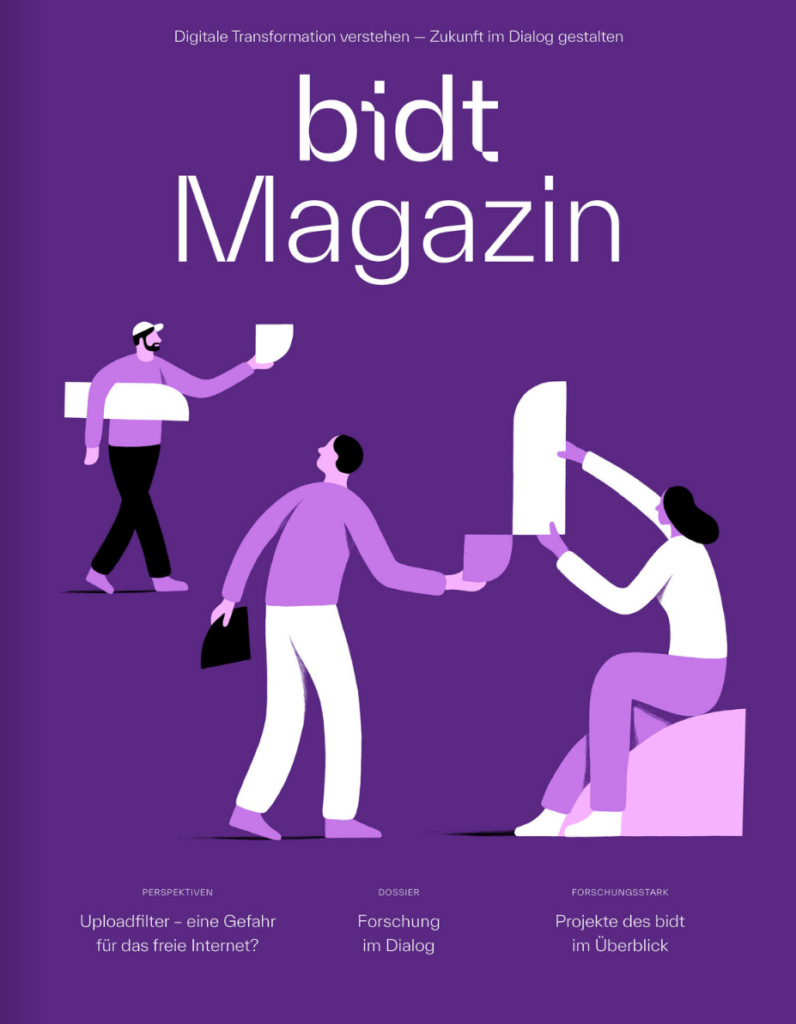Our MissionUnderstanding Digital Transformation –
Shaping the Future Together
In Focus

Magazine
A look behind the scenes: in the second issue of our bidt magazine, we introduce you to our research and the people at the Institute and provide insights into the interdisciplinary collaboration within the different projects.
Among other inspiring topics, Prof. Alexander Pretschner (Chairman of the board of directors) and Dr. Margret Hornsteiner (Head of Communications and Dialogue) discuss the importance of dialogue in research on digital transformation. Why do we need data literacy to find our way in a data-driven world? What role does communication play in the development of a care robot? And why should diversity and inclusion play a more prominent role in the design processes of AI technologies?
Events
Discover our main topics
Digital Work Environment
Digitalised processes facilitate workflows, while technology enables new forms of communication and collaboration: insights into the opportunities – and possible conflicts – arising from the partnership between humans and machines.

The digital transformation can be seen in all areas of life. Time to take stock and compare Germany, Austria, Finland, France, Italy, Spain and the UK.
Digital Society
How do we succeed in the digital transformation of society? From the state of digitalisation in Germany to questions regarding its benefits for the common good, social change requires a dialogue prioritising knowledge transfer.

Our glossary article highlights the most important facts about digital participation including examples, applications, criticism and problems.
Digital Public Sphere
Digital media, fake news, and the power of opinions – our access to information these days is unparalleled. So how can we shape public discourse, political coordination, and participation? What set of rules is necessary for a digital public sphere?

PUBLICATIONSAll bidt publications are freely accessible
Digital Politics
As a cross-sectional issue, digitalisation presents particular challenges for policymakers. Digital politics unites the social and political questions and responsibilities arising from digital transformation.

A discussion on the future of digital policy, in cooperation with the National Academy of Science and Engineering.
Digital Responsibility
Digital transformation leads to ethical and legal issues when digital technologies are used for the common good, ranging from digital participation to data security.

Julian Nida-Rümelin explains why machines and algorithms can support decision-making with automated processes, but cannot make independent decisions.
Digital Competition
Digitalisation is reshaping the global economic order. As companies digitalise products and services, their market positions are shifting. How can we carve out a European approach to the international digital competition?

An overview of important digitalisation figures.
On the future of the digital society
Fresh insights: Our blog features internal and external expert voices.
More than a job
At bidt, we nurture professional curiosity. Since digitalisation permeates all areas of our lives, as a team we want to actively contribute to a better understanding of digital transformation and its developments – and how to shape them.
 Dr. Christoph Egle, Managing Director bidt
Dr. Christoph Egle, Managing Director bidt


